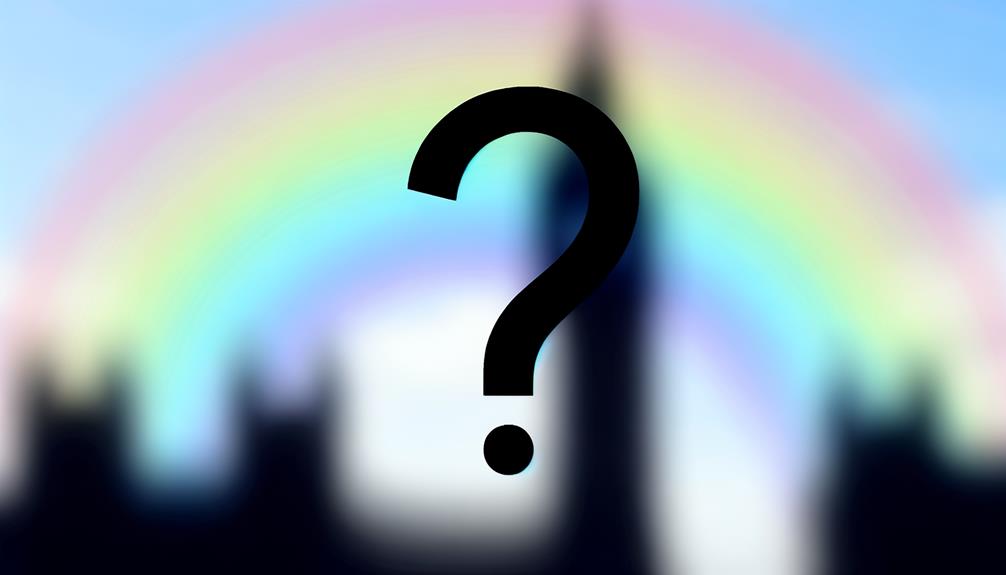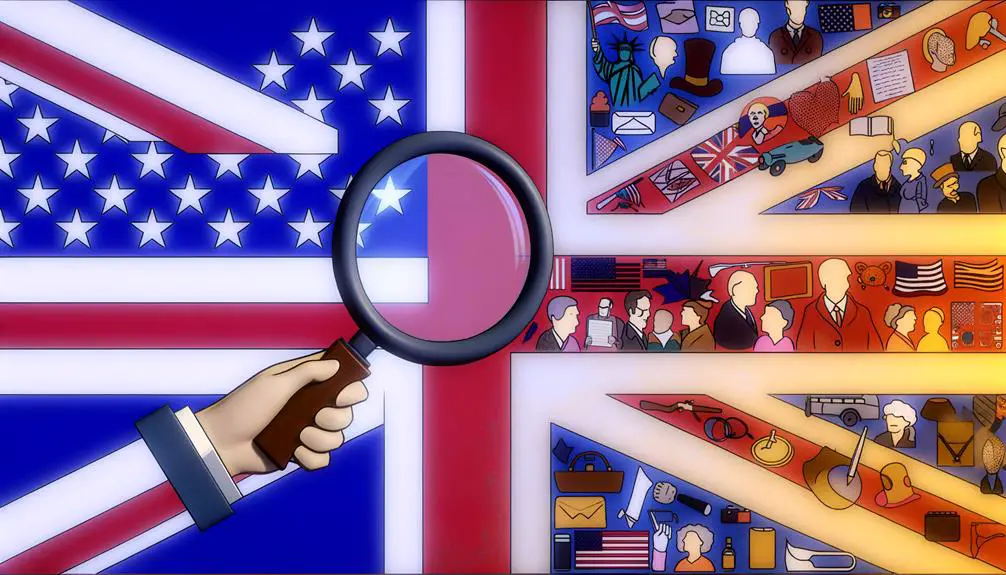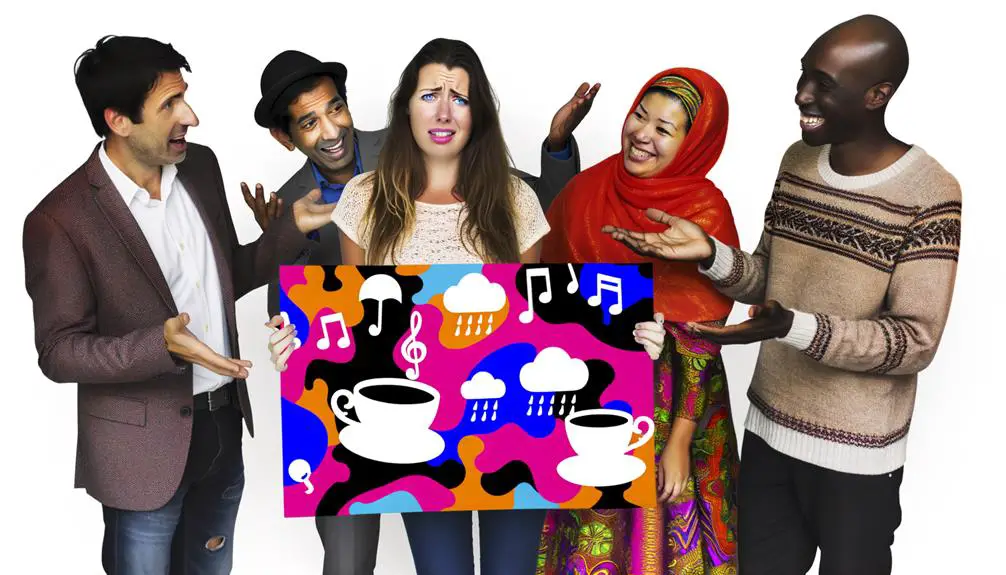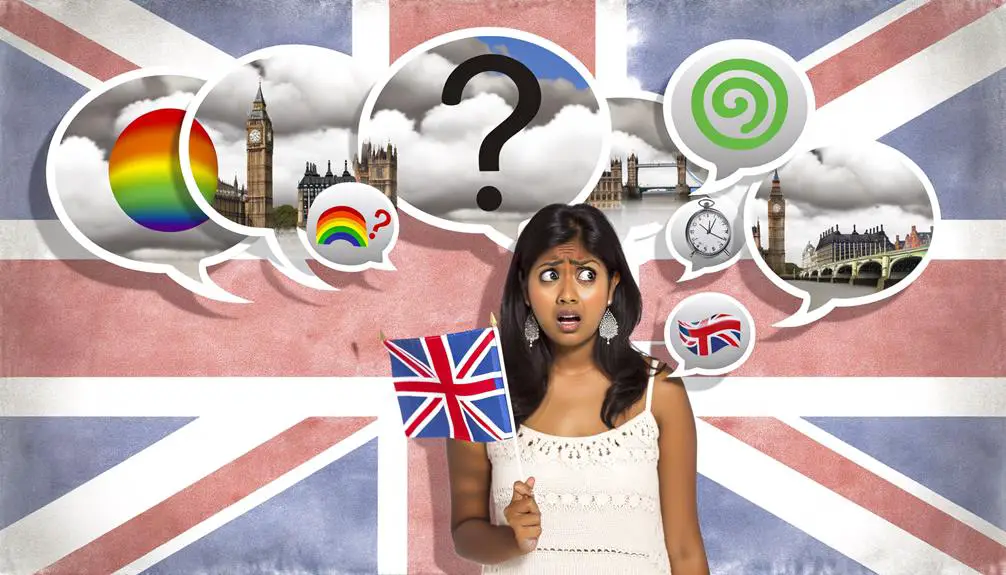In British slang, "bent" is your Swiss Army knife of words, slicing through conversations with meanings as varied as the British weather. Think someone's dodgy? They're bent. This term doesn't just dance around dishonest or corrupt behavior; it waltzes into more nuanced territories, historically hinting at homosexuality with a shade of controversy. But don't toss it aside as mere criticism; it's also a nod to the broken or damaged, with a whisper of hope for repair. Whether it's calling out a questionable referee or whispering secrets in old pubs, "bent" has layers worth peeling back, a journey into the heart of British slang that promises more than meets the eye.
Key Takeaways
- In British slang, 'bent' often implies someone is dishonest or corrupt, especially in professions.
- It can also refer to being homosexual, with a history of derogatory use now shifting.
- The term may describe actions or methods that are considered underhanded or unfair.
- 'Bent' is used in sports contexts to suggest cheating or foul play.
- Understanding the term requires awareness of its cultural nuances and regional variations.
Origins of "Bent"

The word 'bent' has a colorful history, tracing back to a time when English wasn't quite as straight-laced as you might think. Diving into its origins, you're peeling back layers of linguistic evolution that reveal how words shift and shimmy over centuries. It's not just a simple case of etymology; it's a saga of how language morphs, influenced by social changes, migration, and even conquests.
You see, 'bent' didn't just pop up out of the blue. It's been bending its back, so to speak, through various meanings and uses, shaped by the tongues of different regions. These regional variations are fascinating, showing how the same word can twist and turn, taking on new shades of meaning depending on where you're standing—or sitting, in old English taverns, perhaps.
This journey through time highlights the adaptability of language. As communities evolve, so do the words they use, with 'bent' being a prime example of this continuous linguistic dance. It's a reminder that language is not a static artifact but a living, breathing entity, always on the move. So, next time you hear 'bent', think of it as a linguistic chameleon, constantly changing its color to fit the conversational landscape.
Common Meanings
So, you've gotten the gist of where 'bent' comes from, but what's it really saying on the streets of Britain? Whether it's whispering about someone's shady deals, hinting at their sexuality, or lamenting a broken object, 'bent' is as versatile as a Swiss Army knife. Let's unpack these meanings without getting ourselves twisted.
Dishonest or Corrupt
In British slang, 'bent' often implies someone's skirting the murky waters of ethical considerations, calling someone 'bent' is a cheeky yet pointed way to question their integrity. It's a label that sticks, often more adhesive than a Post-It note in a hurricane. This term isn't just a local quip; it carries weight in global perceptions, too. It's as if the world's collective eyebrow raises at the mention, understanding the gravity behind the accusation without needing a translator. So, if you hear whispers in the pub or the office corridors about someone being 'bent,' you're not just eavesdropping on gossip. You're tuning into a frequency where shortcuts and shifty behaviors are called out, no holds barred.
Homosexual Connotation
While 'bent' might often hint at someone's dubious ethics, it's also slang for being homosexual, a usage that's as layered as it is historic. In the tapestry of British slang, 'bent' weaves through conversations with a cheekiness that belies its deeper roots. Historically, it might've carried a sting, but modern interpretations have twisted it, embracing a more nuanced, often lighter touch. Social acceptance has shifted the weight of the word, turning what could be a barb into a badge for some. It's a demonstration of the fluidity of language and culture, showing how a term can evolve from derogatory to a marker of identity, pride, or simply the subject of a nudge and a wink.
Broken or Damaged
Diving into another layer, you'll find 'bent' often signifies something's broken or damaged, blending wit with the stark reality of imperfection. It's not just about the physical twist or warp; it's the charming British way of acknowledging that not everything holds up under pressure. But don't despair; this isn't the end of the road. With a bit of ingenuity and an arsenal of repair techniques, what's bent can often be straightened. It's a nod to the material resilience and the human spirit's knack for patching things up, making them good as new. So, when you hear something's 'bent', it's not just a statement of condition—it's a challenge to fix, to restore, to make right. It's British slang at its most constructively critical.
"Bent" in Legal Context
You'll find that 'bent' often refers to someone in the legal profession who's believed to be corrupt or unethical. It's a cheeky term, casting a shadow of doubt over those who are supposed to uphold the law, not bend it to their will. The term has wiggled its way through courtrooms and legal documents, often surfacing in heated discussions about integrity within the judiciary and law enforcement. It's not just a casual jab; it underscores a deep-seated concern about the fairness and impartiality of legal proceedings.
As society evolves, so do its legal frameworks. Court interpretations and legal reforms often dance around the fine line of what's considered 'bent' behavior, aiming to straighten out the crooked paths without snapping the stick. The term has nudged policymakers towards more transparent practices, in hopes of restoring public faith in legal systems. It's the linguistic equivalent of holding a mirror up to the law, prompting self-reflection and, ideally, reform.
Sexuality Implications

Shifting gears, it's worth noting that 'bent' also carries significant undertones when discussing sexuality, often used to imply non-heterosexuality in a not-so-flattering light. This slang term, steeped in controversy, has evolved over time. What started as a derogatory label has been somewhat reclaimed by the LGBTQ+ community, though its use remains contentious. You're exploring a linguistic minefield here, where context is king and the speaker's intent can dramatically alter the word's impact.
Modern interpretations of 'bent' are as varied as they come, touched by global variations and the ever-changing landscape of language and identity. In some circles, it's a badge of pride, a defiant embrace of one's true self in the face of societal norms. Elsewhere, its usage can still sting, a reminder of times when such terms were exclusively pejorative.
Exploring the global variations of 'bent' reveals a fascinating study in cultural attitudes towards sexuality. From the UK's gritty streets to the bustling urban centers worldwide, 'bent' encapsulates the tension between traditional values and the push for more inclusive, understanding societies. So, while you're tossing around British slang, remember: words are powerful, and 'bent' is as loaded as they come.
Usage in Sports
In the domain of sports, 'bent' takes on a whole new game, illustrating the fierce competitiveness and sometimes underhanded tactics employed by athletes. When you're immersed in the world of sports, whether you're on the field or cheering from the sidelines, you'll notice that 'bent' isn't just a curve in the road. It's a curveball in the game plan, often thrown with a wink and a nod to those in the know. Here's how 'bent' plays out in the sports arena:
- It can hint at questionable team strategies, raising eyebrows among fans and foes alike.
- Performance critiques often come laced with 'bent', questioning the fairness or integrity of a player's standout moment.
- It's whispered in the stands and shouted in the pubs, a code word for the controversial referee decision that changed the game's outcome.
- Behind closed doors, 'bent' might describe the under-the-table dealings that secure a player's transfer or a sponsor's deal.
- In the locker room, it's a jab at a teammate's unexpectedly brilliant or suspiciously timely performance, suggesting more than meets the eye.
In sports, 'bent' is the spice that flavors the conversation, turning the mundane into the memorable with a dash of British wit.
Comparisons With American Slang

How does 'bent' stack up against American slang, you might wonder? Well, you're in for a linguistic ride. The British and American lexicons might as well be cousins who only see each other at family reunions. They recognize each other, sure, but there's always a bit of an awkward pause.
| British Slang | American Slang |
|---|---|
| Bent (dishonest) | Crooked |
| Gutted (devastated) | Bummed |
| Knackered (exhausted) | Beat |
Diving into these regional dialects reveals the vibrant tapestry of slang evolution on either side of the pond. While Brits might say someone's 'bent' for engaging in sketchy dealings, Americans prefer their crooks 'crooked'. It's the same game, just different playbooks.
The charm lies in these subtle differences, a linguistic dance of sorts. It's a demonstration of how language morphs across oceans and continents, adapting to its environment like a chameleon. So, next time you're decoding British slang or American colloquialisms, remember you're not just learning new words. You're witnessing the evolution of language in real-time, a never-ending story of adaptation and change.
Examples in British Media
Exploring how British media immerses its content with local slang offers a fascinating glimpse into the cultural nuances that shape language. As you delve into the world of British TV shows, films, and literature, you'll notice how the term 'bent' pops up in various contexts, each use shedding light on character portrayal and highlighting regional variations. Here's a glimpse into how 'bent' is woven into the fabric of British media:
- TV Dramas: Often used to describe a corrupt police officer, revealing a character's moral ambiguity.
- Comedies: Poked fun at for its double entendre, showcasing British humor's love for wordplay.
- Reality TV: Cast members might use 'bent' to question someone's honesty, reflecting everyday speech patterns.
- Documentaries: Explore the term's evolution in British society, offering a historical perspective.
- News Broadcasts: Occasionally, journalists use 'bent' to describe political scandals, emphasizing the gravity of deceit.
Navigating Sensitivities

Now, let's tiptoe into the minefield of sensitivities. You've seen how 'bent' plays out in British media, but grasping the cultural context and being aware of its impact can save you from a social faux pas. It's all about reading the room, so you don't end up bending the wrong way in conversation.
Understanding Cultural Context
Exploring the cultural context of British slang, particularly the term 'bent', requires moving cautiously to avoid misunderstandings and offense. Grasping the nuances tied to this word means acknowledging that what's said in jest in one region might ruffle feathers in another. Here's a quick guide to keep you in the know, without stepping on toes:
- *Cultural nuances* can drastically alter a word's reception.
- Regional variations mean one term's innocent in London but eyebrow-raising in Liverpool.
- Historical context matters; words evolve.
- Local attitudes shift perceptions; stay updated.
- Humor varies; what's funny to one may not be to another.
Navigating British slang, especially 'bent', demands a keen ear for context and a sensitivity to its colorful tapestry of meanings.
Language Impact Awareness
Diving into the world of British slang, you'll find that being mindful of language can save you from a world of misinterpretation and offense. Language evolution and societal perceptions shape the way we communicate, often turning innocent phrases into loaded statements. It's a linguistic minefield!
| Slang Term | Why Care? |
|---|---|
| Bent | Context is king. Avoid unintended implications. |
| Cheeky | Fun or rude? Know your audience. |
| Knackered | Harmless or too informal? Gauge the setting. |
Understanding the nuances of British slang isn't just about broadening your vocabulary; it's about maneuvering the cultural landscape with sensitivity and awareness. Remember, what's said in jest in one circle might just ruffle feathers in another. Stay sharp, stay informed, and you'll dodge those linguistic faux pas like a pro.







